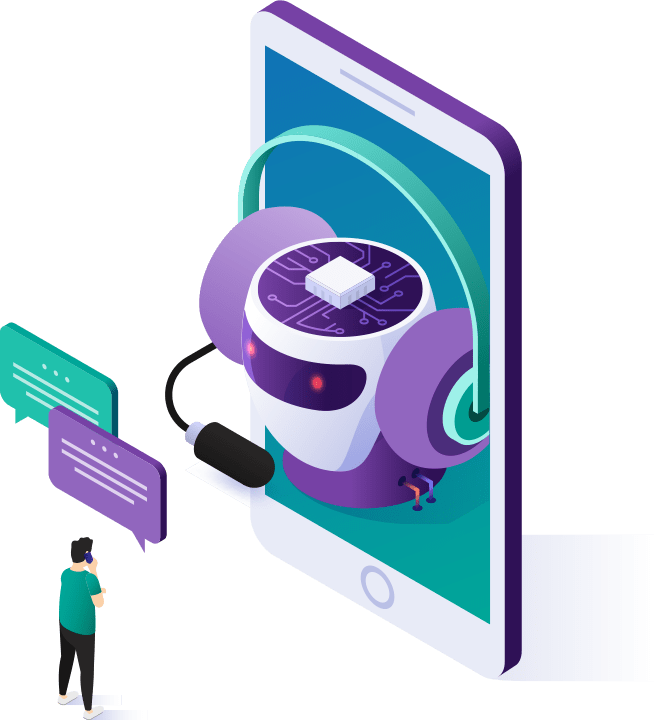Automate Your Customer Support
Automation allows customer support teams to empower customers to self-serve efficiently and conversationally with the help of AI agents.

Automate Your Support Teams with AI
Treat your customers to the seamless support they’ve always wanted—swiftly, effortlessly, and without the hassle of navigating through endless button prompts. With automated support through IVR automation, here’s what you stand to gain:
- A Warm Welcome: Forget the cold, mechanical IVR scripts. Embrace conversations that flow naturally and warmly, thanks to our intelligent virtual agents designed to mimic human interaction to a T. This is automated support at its most engaging.
- Always Open: Our automated support system ensures your customers have the assistance they need whenever they need it, 24/7. This relentless availability takes the pressure off your human staff, allowing them to concentrate on tasks that require a human touch.
- Streamlined Efficiency: Welcome to a world where cost reductions are a reality, thanks to the power of automated support. Our virtual agents are adept at handling routine inquiries, enabling your human agents to focus on more complex, value-driven interactions.
- Insights You Can Act On: Leverage SmartAction’s analytics for a deep dive into customer preferences and behavior. Use these insights to customize your services, making your automated support not just efficient but also personal and targeted.
- Smooth Integration: Transitioning to our state-of-the-art virtual agents is a breeze. Our technology is crafted for seamless integration with your existing systems, ensuring a smooth shift to more effective, automated support.

Automated Customer Support and Self-Service
The sphere of customer support is constantly evolving, morphing into a robust entity that’s driven by advanced technology. In today’s digital forefront, one of the revolutionary concepts is ‘Automated Self Service.’ This radical approach fuels the prime idea of providing customers the ease and convenience of resolving their own queries, saving valuable time for both the customer and the service provider.
Automated self-service is the convergence of Artificial Intelligence (AI) and customer service, paving the way for an enriched user experience. Predominantly seen in the functionality of contact centers, it works by empowering customers with a platform that’s accessible around the clock. Here, customers have the freedom to troubleshoot their problems, thereby reducing the dependence on live agents. In essence, it is a seamless blend of self-service technology and AI-based customer support.
SmartAction is the key orchestrator, enmeshing conversational AI technology with a myriad of customer support services to deliver the ultimate customer experience. By deploying automated self-service, SmartAction helps leading brands handle the multitude of customer calls inundating contact centers. The AI-powered virtual agents manage these common calls, freeing the live agents to tackle more intricate customer issues.
What does automated self-service imply? By the integration of self-service technology and AI-based customer support, it enables the customer to find solutions to their issues sans the need for live assistance. This vastly enhances the customer experience, elevating satisfaction levels. To truly comprehend the power of automated self-service, consider its augmentation in the artificial intelligence realm. The advent of AI-based customer support, like chatbots or voice assistants, signals a paradigm shift in customer service.
Often backed by machine learning, these tools handle complex tasks, like providing real-time recommendations, giving updates about services, or assisting in purchase decisions. Essentially, they are capable of simulating human-like conversations and interactions, rendering a significantly improved customer experience.
Why should businesses gravitate towards the automation of self-service? The answer lies in cost and time efficiency, increased customer satisfaction, and the ability to focus human resources on more strategic tasks. Automated systems can manage thousands of interactions simultaneously, ensuring rapid response times and negating the risk of human error. This equates to reduced operational costs and higher levels of customer satisfaction. Brands can also tailor these automated systems to echo their brand voice and values, fostering a more personalized and engaging relationship with customers.
Meanwhile, service agents can channel their efforts into handling more complex queries, thus enhancing operational efficiency. In conclusion, as a modern, progressive, and transformational solution, automated self-service is crucial for businesses striving to raise the bar in customer experience. Its adoption is both a strategic move to optimize resources and a tactical route to build stronger customer relations.
By weaving in AI technology with the ethos of self-service, SmartAction continues to evolve and redefine the landscape of customer support, fostering an atmosphere of innovation and customer-centricity. The future beckons a new era where automated systems will be the cornerstone of successful customer engagement strategies.
Types of Automated Self-Services
In the crowded market of customer service, leading organizations are turning to automated self-services to enhance their customer’s experience while maintaining operational efficiency. To truly comprehend the magnitude of automated self-service, consider how far automated Interactive Voice Response (IVR) systems have come. From simple telephonic menus to intuitive experience creators, they’re the front line of customer service in many centers, resolving basic inquiries and routing calls.
When properly implemented, they seamlessly direct callers to the correct representative without the frustrating wait times often associated with customer call centers. Think about conversational chatbots, another form of automated self-service. These AI-powered wonders function at their best when emulating the intelligence of a human agent. They’re able to understand and respond to complex customer inquiries through a chat interface on a website or mobile application. And that is thanks to a powerful combination of the latest artificial intelligence technologies.
Powered by machine learning and natural language processing, they analyze past interactions to continually improve their conversation skills, creating a model of customer service that’s efficient, timely, and personalized. These conversational chatbots are the upgraded cousins of Automated IVR systems in text format.
While the IVR opens a channel for voice communication, conversational chatbots provide an equally effective, text-based medium for customers to have their queries and issues attended to. Both pave the way for 24/7 customer service availability, making it vastly more convenient for customers to get the help they need when they need it. However, the star of the automated self-services world is arguably the virtual agent.
Often referred to as AI call assistants, these advanced models of AI technology bridge the gap between Interactive Voice Responses and human customer service providers. They hold interactive dialogues, comprehend customer issues, and solve them in real time. They’re your customer service operative, linguist, and problem solver, all rolled into one. When brands introduce these plentiful automated self-service examples into their response strategies, they invariably witness a reduction of load on live agents, who are then free to focus on more complicated customer inquiries.
The result is an altogether refined, quick, and satisfying customer service experience that caters to modern-day demand for immediacy and quality. To reap these advantages, deploying the right type of automated self-service is pivotal. This implementation needs a collaborative approach with expert guidance every step of the way. However, collaboration is not always easy to foster in the workplace.
Realizing this, companies such as SmartAction have bundled the latest in conversational AI technology and expert services to deliver fine-tuned virtual agents, ongoing improvements, and support for businesses. In conclusion, automated self-services are revolutionizing customer service through varied formats like the IVR system, conversational chatbots, and AI call assistants. This technology renders customer service accessible, efficient, personalized, and, most importantly, available round-the-clock. It’s the future of customer service, and the future is here.
Benefits and Challenges of Automated Self-Service
Unveiling an era of revolutionizing customer service routine, we deliberate the notion of Automated Self Service. More than a mere buzzword, automated self-service is a radical paradigm shift that has enchanted the realm of customer service, influencing businesses to rethink traditional methods. So, what has come out of this rethinking?
Businesses globally are embarking on this digital expedition, striving to implement self-service automation, an enterprise trend triggered by the blend of benefits it offers. At the heart of automated self-service is the automated self-service app, an innovation that encapsulates the culmination of digital ingenuity.
Through its intelligent functioning, the app serves as a virtual assistant catering to the basic customer needs. The application stems from the convergence of artificial intelligence and machine learning algorithms, providing customers with instant, accurate, and tailored responses. With a 24/7 availability for addressing queries, the app scales the efficiency and effectiveness of businesses by offering uninterrupted service and simultaneously reducing the workload of customer service personnel.
Nevertheless, like all technological innovations, understanding and optimizing for the potential challenges of an automated self-service system is equally important. Integrating the system into the current infrastructure might seem intimidating, mainly due to the initial financial investment and the probable requirement of workforce training. Moreover, striking a perfect balance between automation and human touch is vital to avoid the depersonalization of customer service.
While reflecting on the context of contact center automation, it becomes pivotal to spotlight AI. Channeling Automated Self Service through a plethora of communication modes is essential for the accessibility and convenience of customers. One such mode gaining popularity is call center automation AI. As a cutting-edge technological manifestation, it structures and simplifies customer service routines by automating tasks traditionally handled by human operators.
Cleverly programmed to understand and respond to user inquiries, this form of automation can trim down response time, augment agent productivity, and, essentially, augment customer satisfaction. Conversational AI automation, on the other hand, fosters an advanced level of communication between a business and its customers. At the end of the day, this professional communication is the lifeblood of any thriving business.
Employing natural language processing and learning algorithms, it ensures dynamic and personalized interactions. When used in implementation with contact center automation, this technology invariably leads to a seamless customer journey with real-time resolutions and a gratifying user experience. In the vast arena of service providers, The pace of mind in customer relations is priceless. That the process is automated, saving your company money, is a welcome bonus.
SmartAction emerges as a viable solution for this automated self-service narrative. Its ground-breaking AI technology, coupled with expert service, allows it to deliver around-the-clock customer support through voice, chat, and text messages. Brands trust SmartAction for its meticulously designed virtual agents, which not only handle an overwhelming volume of customer calls but also create more space for live agents to engage with intricate customer needs. Competing automated self-service products can’t offer this to your business.
What sets SmartAction apart is its commitment to continual support post-deployment, ushering progressive improvements to ensure that AI agents consistently provide superior conversational AI experiences to customers. To conclude, automated self-service is the essence of modernity in customer service approaches. Not only does it significantly optimize productivity and cost-efficiency, but it also enhances the overall customer experience, making it an instrumental part in shaping the future of business operations. To learn more, request a demo of SmartAction today.

